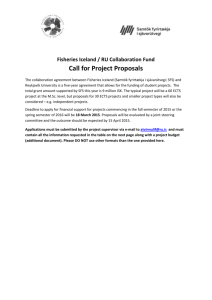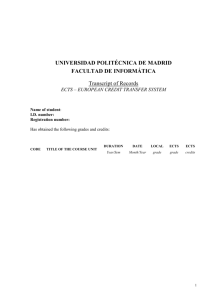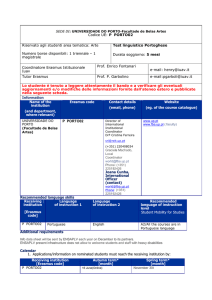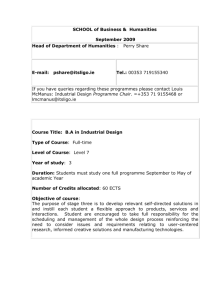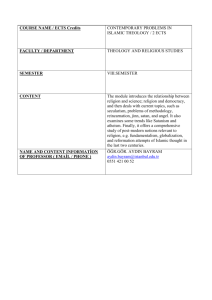- Institute of International Relations University of Warsaw
advertisement
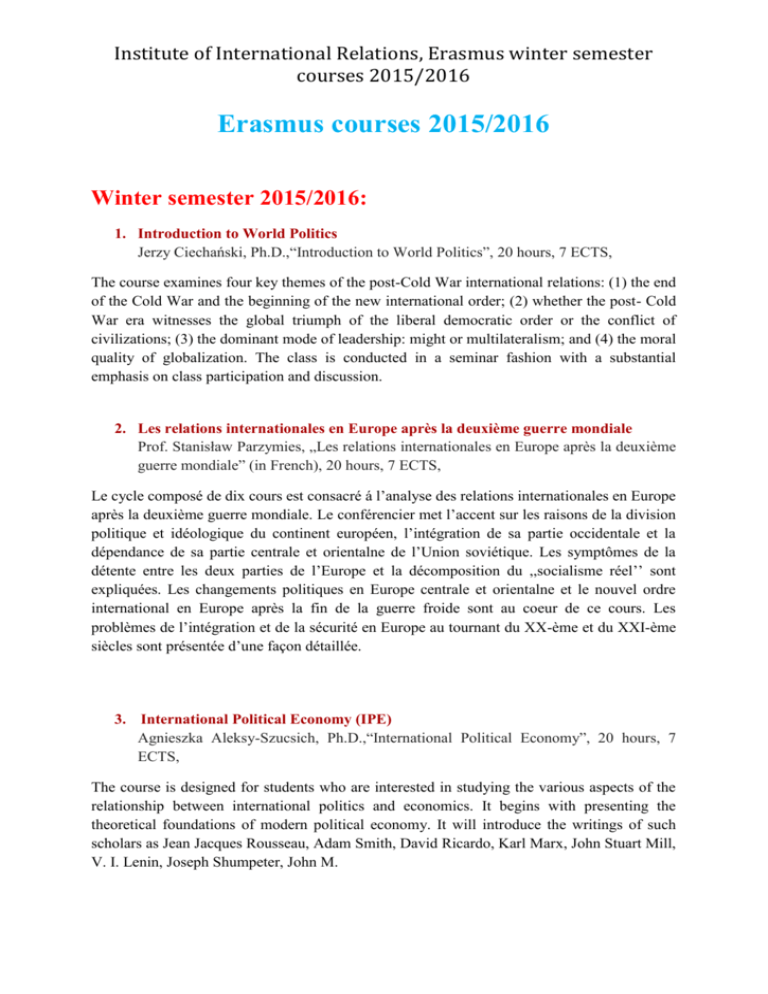
Institute of International Relations, Erasmus winter semester courses 2015/2016 Erasmus courses 2015/2016 Winter semester 2015/2016: 1. Introduction to World Politics Jerzy Ciechański, Ph.D.,“Introduction to World Politics”, 20 hours, 7 ECTS, The course examines four key themes of the post-Cold War international relations: (1) the end of the Cold War and the beginning of the new international order; (2) whether the post- Cold War era witnesses the global triumph of the liberal democratic order or the conflict of civilizations; (3) the dominant mode of leadership: might or multilateralism; and (4) the moral quality of globalization. The class is conducted in a seminar fashion with a substantial emphasis on class participation and discussion. 2. Les relations internationales en Europe après la deuxième guerre mondiale Prof. Stanisław Parzymies, „Les relations internationales en Europe après la deuxième guerre mondiale” (in French), 20 hours, 7 ECTS, Le cycle composé de dix cours est consacré á l’analyse des relations internationales en Europe après la deuxième guerre mondiale. Le conférencier met l’accent sur les raisons de la division politique et idéologique du continent européen, l’intégration de sa partie occidentale et la dépendance de sa partie centrale et orientalne de l’Union soviétique. Les symptômes de la détente entre les deux parties de l’Europe et la décomposition du ,,socialisme réel’’ sont expliquées. Les changements politiques en Europe centrale et orientalne et le nouvel ordre international en Europe après la fin de la guerre froide sont au coeur de ce cours. Les problèmes de l’intégration et de la sécurité en Europe au tournant du XX-ème et du XXI-ème siècles sont présentée d’une façon détaillée. 3. International Political Economy (IPE) Agnieszka Aleksy-Szucsich, Ph.D.,“International Political Economy”, 20 hours, 7 ECTS, The course is designed for students who are interested in studying the various aspects of the relationship between international politics and economics. It begins with presenting the theoretical foundations of modern political economy. It will introduce the writings of such scholars as Jean Jacques Rousseau, Adam Smith, David Ricardo, Karl Marx, John Stuart Mill, V. I. Lenin, Joseph Shumpeter, John M. Institute of International Relations, Erasmus winter semester courses 2015/2016 Keynes and Friedrich A. Hayek. Then it focus on the current topics and debates which command the attention of IPE scholars such as international trade, development, international finance and global markets. It conclude with a discussion of the recent financial crisis. 4. International Migration Justyna Nakonieczna PhD, “ International migration”, 20 hours, 7 ECTS Theoretical approach to international migration; Evolution of international migration – historical perspective; Trends in the current international migration – global and regional perspective; State and International Migration: Migration policies -Incorporation: multiculturalism/assimilation/ integration; State and International Migration: The Quest for Control; International migration and economy: International Remittances, the problem of brain drain and brain waste; International migration and environment; International migration and conflicts. 5. Security System in the Asia-Pacific Region Jakub Zajączkowski PhD. „Security system in the Asia-Pacific Region”, 20 hours, 7 ECTS, The Asia-Pacific region – description. Classification and systemization of security threats in the region. The arms race in Asia. The division of Korea. The division of China and security in the Asia-Pacific region. The security sub-system in South Asia. Territorial disputes and conflicts concerning Asian seas. Territorial disputes and conflicts in Asia. Institutions of regional security. US regional strategy. The system of US bilateral alliances in the AsiaPacific region. The regional strategy of China. US-China relations – regional and global significance. Regional strategies of Russia, Japan and India. The importance of the AsiaPacific region in international relations at the turn of the 21st century. 6. International Protection of Human Rights Agnieszka Bieńczyk-Missala, Ph.D., „International Protection of Human Rights”,20 hours, 7 ECTS, The course offers an opportunity to study human rights in the context of law, politics and security. Course Content: Historical Development of International Protection of Human Rights, Human Rights in the United Nations System, Human Rights Protection in the Council of Europe, OSCE Human Dimension, the European Union and Human Rights, ExtraEuropean Systems. Protection of National and Ethnic Minorities, Genocide and Massive Violations of Human Rights, the Concept ‘Responsibility to Protect’, Non-Governmental Institute of International Relations, Erasmus winter semester courses 2015/2016 Actors of Human Rights, International Humanitarian Law, Human Rights in International Policy, New Ideas and Challenges for Human Rights. 7. Monetary and Financial Integration in Europe Karina Jędrzejowska PhD, “Monetary and Financial Integration in Europe”, 20 hours, 7 ECTS The course is designed to present various aspects of monetary and financial integration in Europe. It starts with theoretical introduction into issues of financial integration and globalization. Next, it focuses on monetary integration in the European Union - its origins, history, and main features of the Economic and Monetary Union. It will also address its current challenges including international position of the euro and the European sovereign debt crisis. In the second half of the course, the focus will shift towards integration of financial markets in the European Union. The following issues will be discussed: concept of policy-led financial market integration in the EU (including the Financial Services Action Plan), banking union in the EU and the European System of Financial Supervisors. The module will be taught in seminar manner, linking brief lectures with discussion with participants. Summer semester 2015/2016: 1. International Security and Armed Conflicts Kamila Pronińska, Ph.D., 20 hours, 7 ECTS, Course starts from Development and evolution of security studies – theories of international security. International security paradigm after the Cold War – nonmilitary dimensions and asymmetric threats to security. Military security – regional and world trends, military expenditure, arms production and international transfers. Armed conflicts in contemporary IR – major conflicts, new tends, sources and consequences . International security institutions – ius contra bellum, non proliferation and arms control regimes, evolution of the United Nations, NATO and regional security organizations. Economic and energy security –threats and international rivalry over strategic resources. Environmental security - securitization of climate changes and water problem in IR. Human security concept. 2. Developing Countries in International Relations Jakub Zajączkowski, Ph.D, 20 hours, 7 ECTS, Course starts from Institute of International Relations, Erasmus winter semester courses 2015/2016 Developing Countries and International Relations Theory. Classification and systemization of security threats in Developing Countries. Human Rights and Democracy in Developing Countries. Economic Challenges and problems of Developing Countries. Political and Economic Cooperation of Developing Countries. Emerging Powers in International Relations. U.S. EU and Japan’s international strategies towards Developing Countries. North-South: cooperation, divisions, implications. 3. History of European Integration Andrzej Szeptycki, Prof., „History of European Integration”, 20 hours, 7 ECTS The course is divided into four parts: the origins of Europe and the idea of the European unity, the development of the European Communities during the Cold War, the creation of the European Union, the development of the EU since 1993. The accent will be put not only on legal aspects of the European integration process, but also on political issues, member states interests and the role of political leaders. 4. Asymmetric Threats Marek Madej. Ph.D., 20 hours, 7 ECTS, The concept of asymmetric threats – roots, the essence, specificity, weaknesses. Typologies of asymmetric threats. Domestic and international terrorism, Transnational Organized Crime, Information security threats posed by non-state actors, Use of WMD. 5. Poland’s Foreign Policy Agnieszka Bieńczyk-Missala, Ph.D., 20 hours, 7 ECTS, The main aim of the course is to give students a possibility to recognize central issues of Polish foreign policy after World War II with special regard to the last 20 years since the end of the Cold War and regaining full independence. The scope of the curriculum includes subjects of domestic as well as external determinants of Polish foreign policy. It also provides them with knowledge of key issues like Polish attitude towards European integration, security in Polish politics. Finally, it covers bilateral relations with Germany, Russia and the United States. 6. Introduction to International Relations Jerzy Ciechański, Ph.D., 20 hours, 7 ECTS, Institute of International Relations, Erasmus winter semester courses 2015/2016 The course examines key themes of the post-Cold War international relations. The class is conducted in a seminar fashion with a substantial emphasis on class participation and discussion. Course focus on such topics like: the global triumph of the liberal democratic order or the conflict of civilizations; the dominant mode of leadership: might or multilateralism; the moral quality of globalization, perspectives on future balance of power. 7. U.S. National Security Policy Aleksandra Jarczewska, Ph.D., 20 hours, 7 ECTS, The general concept of this course is to acquaint students with the U.S. national security issues. Among the key problems discussed in the class are: U.S. relations with other states, war on terror, asymmetric conflicts and cyber terrorism; U.S. military power and the proliferation of WMD; organized crimes; globalization and global economic interdependence; economic crisis and its consequences for the U.S. security; internal and international migrations; environmental degradation. The course will consist of introduction, three main modules (each concentrated on particular group of issues) and end with defining new challenges for the U.S. security strategy


